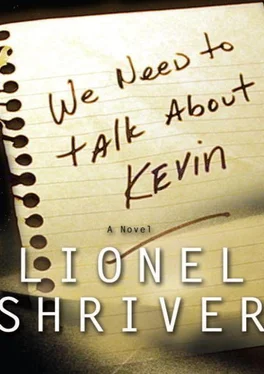But Kevin’s displeasure is not the only thing that his victims had in common. Okay, throw out the cafeteria worker, clearly there by mistake; Kevin has a neat mind, and he’d prefer a tidy group of ten. Otherwise, every one of them enjoyed something . Never mind whether this passion was pursued with any flash; whatever his parents claim, I gather Soweto Washington hadn’t a chance at going pro; Denny was (forgive me, Thelma) an atrocious actor, and Greer Ulanov’s petitioning New York congressmen who were going to vote with Clinton anyway was a waste of time. No one is willing to admit as much now, but Joshua Lukronsky’s obsession with movies was apparently annoying to many more students than just our son; he was forever quoting whole sequences of dialogue from Quentin Tarantino scripts and staging tiresome contests at lunch, when the rest of the table preferred to negotiate trades of roast beef sandwiches for slices of pound cake, over who could name ten Robert DeNiro films in chronological order. Be that as it may, Joshua did love movies, and even his outright irksomeness didn’t keep Kevin from coveting the infatuation itself. It didn’t seem to matter infatuation with what. Soweto Washington loved sport and at least the illusion of a future with the Knicks; Miguel Espinoza, learning (at any rate, Harvard); Jeff Reeves, Telemann; Denny Corbitt, Tennessee Williams; Mouse Ferguson, the Pentium III processor; Ziggy Randolph, West Side Story, not to mention other men; Laura Woolford loved herself; and Dana Rocco—the ultimate unforgivable—loved Kevin.
I realize that Kevin doesn’t experience his aversions as envy. To Kevin, all ten of his victims were supremely ridiculous. They each got excited over trifles, and their enthusiasms were comical. But like my wallpaper of maps, impenetrable passions have never made Kevin laugh. From early childhood, they have enraged him.
Sure, most children have a taste for spoliation. Tearing things apart is easier than making them; however exacting his preparations for Thursday , they couldn’t have been nearly as demanding as it would have been to befriend those people instead. So annihilation is a kind of laziness. But it still provides the satisfactions of agency: I wreck, therefore I am. Besides, for most people, construction is tight, concentrated, bunchy, whereas vandalism offers release; you have to be quite an artist to give positive expression to abandon. And there’s an ownership to destruction, an intimacy; an appropriation. In this way, Kevin has clutched Denny Corbitt and Laura Woolford to his breast, inhaled their hearts and hobbies whole. Destruction may be motivated by nothing more complicated than acquisitiveness, a kind of ham-handed, misguided greed.
I watched Kevin despoil other people’s pleasures for most of his life. I can’t count the number of times I picked up the word favorite during some hot-under-the-collar maternal diatribe—the red galoshes stuffed with snack cake in kindergarten were Jason’s favorite footwear. Kevin could easily have overheard that the white caftan he squirted with concord grape juice was my favorite floor-length dress. For that matter, each walking adolescent bull’s-eye in that gym was some teacher’s favorite student.
He seems to especially revile enjoyments I can only call innocent. For example, he habitually beelined for anyone who was poised to snap a photograph and walked deliberately in front of the lens. I began to dread our trips to national monuments, if only on behalf of the Japanese and all their wasted film. Why, across the globe are scattered dozens of collectible snaps, blurred head shots of the notorious KK in profile.
Further illustrations are countless; I’ll cite only one in detail.
When Kevin had just turned fourteen, I was approached at his middle school’s PTA meeting to chaperone the eighth-grade spring dance. I remember being a little surprised that Kevin intended to go, since he boycotted most organized school activities. (In retrospect, maybe the draw was Laura Woolford, whose shimmering crotch-high frock for the occasion must have set Mary back hundreds.) This end-of-the-year bash was the highlight of the school’s social calendar, and most of his classmates would have been anticipating admission to this exclusively senior rite of passage since the sixth grade. The idea was to give these kids practice at being Real Teenagers and to let them swagger around as kings of the hill before entering the adjoining high school as hacked-on peon freshmen at the bottom of the pecking order.
Anyway, I said I’d do it, not especially looking forward to confiscating pints of Southern Comfort; I treasured the memory of my own hot, surreptitious hits from hip flasks behind the stage curtains of William Horlick High School in Racine. I was never keen on getting stuck with the role of Big Killjoy Meanie and wondered if I might not look quietly the other way so long as the kids were discreet and didn’t get sloppy drunk.
Of course I was naive, and Southern Comfort was the least of the administration’s worries. At our preparatory meeting the week before, the first thing they taught chaperones was how to recognize a crack vial. Graver still, the faculty was still anguished over a couple of national incidents at the start of the calendar year. Kids graduating from eighth grade may be only fourteen, but Tronneal Mangum had been only thirteen when that January in West Palm Beach, he shot and killed another classmate in front of his middle school because the boy owed him $40. Only three weeks later in Bethel, Alaska (it’s embarrassing, Franklin, but I remember all this stuff because when conversation flags at Claverack, Kevin often reverts to reciting his favorite bedtime stories), Evan Ramsey had got hold of his family’s .12-gauge shotgun, murdered a popular school athlete at his desk, shot up the school, and then systematically stalked and blew away his high school principal—in my day, a word whose spelling we were taught to distinguish from principle by the mnemonic, “The principal is your PAL.”
Statistically, of course, in a country with 50 million schoolkids, the killings were insignificant, and I remember going home after that meeting and complaining to you about the faculty’s overreaction. They’d moaned about the fact that there wasn’t enough left in the budget to purchase metal detectors, while training a whole cadre of chaperones on how to frisk every kid on the way in. And I indulged myself in a bit of liberal indignation (that always revulsed you).
“Of course, for ages black kids and Hispanic kids have been shooting each other in shithole junior high schools in Detroit,” I opined over a late dinner that night, “and that’s all very by-the-by. A few white kids, middle-class kids, protected, private-telephone-line, own-their-own-TV suburban kids go ballistic, and suddenly it’s a national emergency. Besides, Franklin, you should have seen those parents and teachers eat it up.” My stuffed chicken breast was getting cold. “You’ve never seen so much self-importance, and when I made a joke once they all turned to me with this it’s not funny expression, like airport security when you make a crack about a bomb. They all love the idea of being on the front line, doing something ooh-ooh dangerous instead of chaperoning a sock hop , for God’s sake, being in the national spotlight so they can participate in the usual politics of hysteria. I swear on some level they’re all jealous, because Moses Lake and Palm Beach and Bethel have had one, what’s wrong with Gladstone, why can’t we have one, too. Like they’re all secretly hoping that as long as Junior or Baby Jane sneaks off without a scratch wouldn’t it be keen if the eighth-grade dance turned into a melee and we could all get on TV before the whole tacky number becomes passé….”
Читать дальше












